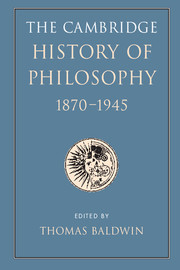Book contents
- Frontmatter
- Contents
- List of contributors
- Introduction
- I 1870–1914
- 1 Positivism, Idealism, and Pragmatism
- 2 Psychology and Philosophy
- 3 Logic, mathematics, and judgement
- 4 Philosophy and the new physics
- 5 The idea of social science
- 15 The debate over the Geisteswissenschaften in German philosophy
- 16 From political economy to positive economics
- 17 Sociology and the idea of social science
- 6 Ethics, politics, and legal theory
- 7 Philosophy of religion and art
- Interlude
- II 1914–1945
- Biobibliographical appendix
- Bibliography
- INDEX
- References
15 - The debate over the Geisteswissenschaften in German philosophy
from 5 - The idea of social science
Published online by Cambridge University Press: 28 March 2008
- Frontmatter
- Contents
- List of contributors
- Introduction
- I 1870–1914
- 1 Positivism, Idealism, and Pragmatism
- 2 Psychology and Philosophy
- 3 Logic, mathematics, and judgement
- 4 Philosophy and the new physics
- 5 The idea of social science
- 15 The debate over the Geisteswissenschaften in German philosophy
- 16 From political economy to positive economics
- 17 Sociology and the idea of social science
- 6 Ethics, politics, and legal theory
- 7 Philosophy of religion and art
- Interlude
- II 1914–1945
- Biobibliographical appendix
- Bibliography
- INDEX
- References
Summary
The decades around 1900 witnessed a lively debate in German philosophy about the nature of knowledge and methodology in the social and cultural sciences, and about the appropriate demarcation criterion distinguishing these Geisteswissenschaften (human sciences) from the more established natural sciences. This debate engaged philosophers (W. Dilthey, W.Wundt, G. Simmel, W.Windelband, H. Rickert) and leaders from the empirical Geisteswissenschaften (K. Lamprecht, M. Weber).
The problem of humanistic knowledge assumed philosophical importance for many reasons, but the most important was a serious tension within a widely held constellation of views about the human sciences. On the one hand, humanistic learning was prominent in the German intellectual landscape, both because of nineteenth-century scholarly achievements, and because of the central place of classical languages and literatures in gymnasium education. Work in the Geisteswissenschaften thus served as an example of intellectual rigour for students and scholars alike, and it was standard to see humanistic learning as exemplary science. On the other hand, the older and more established natural sciences were still paradigms of mature science, and the progress of the natural and human sciences had carried them far apart, both in their methods, and in the nature of their results. Natural sciences subjected phenomena to relatively simple quantitative laws, which permitted improvements in precision and confirmation of theory by controlled experiment. Because the nineteenth century saw repeated extensions of this broad approach to new areas in physics, chemistry, and fields like physiology and psychology, it could claim to be the model for mature scientific knowledge. By contrast, the Geisteswissenschaften in Germany were dominated by the ‘Historical School’, whose highest accomplishments rested on sensitive historical interpretations of unique and valuable cultural achievements.
- Type
- Chapter
- Information
- The Cambridge History of Philosophy 1870–1945 , pp. 219 - 234Publisher: Cambridge University PressPrint publication year: 2003
References
- 7
- Cited by



